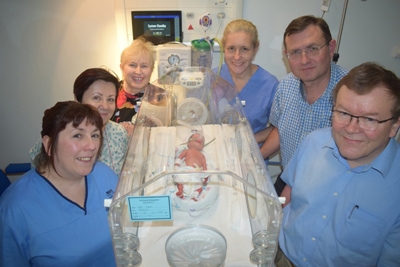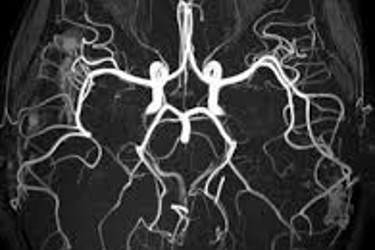
The neonatal team at the Victoria Hospital in Kirkcaldy have become the first in the UK to take delivery of a newly developed advanced preterm baby simulator.
Just over 3,200 babies were born in Fife in 2018, with less than 200 babies were born prematurely (before 37 weeks gestation). Only 7 were born at less than 28 weeks and thanks to our highly-skilled neonatal clinicians, the survival rate for infants born at this gestation is now around 90%. It is important, however, that these specialist staff are able to maintain the skills necessary to provide the complex and intensive care such infants require.
Staff in the Neonatal Unit at the Victoria Hospital in Kirkcaldy raised around £60,000 to fund the purchase of a highly realistic preterm baby simulator to support staff to maintain the skills to necessary to provide high quality care. The money was raised though a series of fundraising activities alongside a contribution of around £40,000 from the Board's endowment funds.
Measuring only 35cm long and weighing less than 1kg, ‘Paul’ as he is known, is roughly the size of a 27 week-old baby. Paul is the most advanced simulation model of its kind, using cutting edge technology to provide a unique and much more realistic patient experience.
Paul will be used to assist in the ongoing training and development of staff caring for preterm babies. In addition to being used by individual clinicians to practice particular interventions, it can also be used by the wider multidisciplinary team to simulate a variety of emergency scenarios in real time.
NHS Fife’s purchase of the device will also benefit patients outwith the local area with the device made available to neonatal units throughout Scotland and the north of England to practice their skills and aid quality improvement for patients in their locality.
Dr Sean Ainsworth is a Consultant Neonatologist within the Special Care Baby Unit at the Victoria Hospital, and he explains how the device is being used to improve practice:
“Providing high quality care for very early preterm infants is a complex and time-sensitive process, and can be particularly challenging for neonatal teams.
“Only a very small number of the infants we see are born at 28 weeks gestation or less so having the opportunity to regularly maintain and enhance our skills, both as individual clinicians and as a collectively, is invaluable.
“The device is already advancing our skills and improving the quality of care we provide to this vulnerable young patient group.”
Baby Penelope Low is currently being cared for in the Special Care Baby Unit at the Victoria Hospital. Tina Low, her mother, said:
“Our daughter was born at 28 weeks and has been here since the 9th December.
“After a while you get to know what is going on and the nurses are really good at explaining everything. You do start to get a bit more comfortable but it’s definitely been a bit of a rollercoaster.
“A few weeks ago we heard about it (Baby Paul) and it was really, really interesting to know what it can do, and what the nurses can do with it.
“It can only improve things and make things better.”
